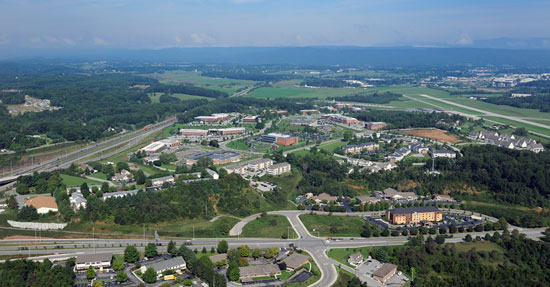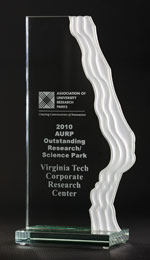 |
|
||||||
|
|
||||||||||||||||||||||||||||||||||||||||||||||||||||||||||||||||||||||||||||||||||||||||||||||||||||||||||||||||||||||||||||
|
Equipped for excellence
by CHAD O'KANE M.A. '11 On a blustery Tuesday afternoon in January, the Wikiteria Market and Café at the Virginia Tech Corporate Research Center (CRC) was abuzz. A line of people stretched to the door, and nary an open table could be found. At first glance, the café appeared to be just another busy lunch spot located inside an office park. Upon closer inspection, this is no ordinary corporate cafeteria. All around, the relationships that result in business deals were being nurtured. The scene was a microcosm of the research park itself: an enclave where leaders of high-tech companies network and share best practices. Successful enough to earn the 2010 Outstanding Research Park award from the Association of University Research Parks, the CRC is now embarking on an expansion to double its square footage. Chances are, park administrators will fill that space using the same model of service that has brought the CRC this far.
According to Joe Meredith (aerospace engineering '69, Ph.D. industrial and systems engineering '97), president of the CRC for the past 18 years, most research parks function merely as real estate entities, encouraging little contact between the park's leadership and its tenants. The CRC at Virginia Tech, however, is unlike most research parks. "What differentiates our park is our strategy to focus on being a partner of the companies and providing services in hopes that [the companies will] be more successful," Meredith said. Such services run the gamut, offering assistance to technology companies in a variety of capacities. The business assistance program, managed by the Pamplin College of Business, utilizes outstanding business students to aid tenants in numerous functions, including market research, business planning, and competitive-market assessments. Several presidents' councils—monthly meetings of eight to 10 company leaderes—help to foster self-discovery and professional growth among the companies in the park. The financial assistance program takes advantage of the CRC's relationship with Virginia Tech alumni who manage financial entities to help companies obtain funding, particularly helpful for nascent companies in the early stages of development, when financing can be a big hurdle. "By far the hardest money to get [is money] early in the process," Meredith explained. "The first dollar is just hard." The CRC also manages an incubation program, VT KnowledgeWorks, designed to accelerate business growth in the pre-launch and enterprise stages. According to director Jim Flowers, at the core of the incubation program is risk-reduction. "We don't create opportunities for businesses," said Flowers, who helped to create VT KnowledgeWorks in 2004. "But we're in a position to provide access to information that will reduce the risk associated with those opportunities." Michael Fleming (mechanical engineering '02, M.S. '03), president of TORC, a robotics company that recently graduated from VT KnowledgeWorks, credits the program for his company's early success. "Early counseling and advice on business issues that technologists and engineers tend to neglect were crucial," Fleming said. "It takes a lot more than good technology to be successful." VT KnowledgeWorks, currently serving 65 companies in various stages of development, takes an ad hoc approach to each member, maintaining the flexibility to change and adapt to the needs of its clients. "The world is changing so fast. We're constantly reinventing the program and the service offerings to keep up with the changing environment," Flowers said. In a sense, VT KnowledgeWorks acts as a testing ground for the larger CRC. Flowers explained, "Research parks need to have stability, whereas we can test things out and revamp."
While companies at the CRC clearly benefit from proximity to campus and access to research faculty and students, Tech and the surrounding community also benefit from the park's presence. A wholly owned subsidiary of the Virginia Tech Foundation, the CRC annually remits $500,000, which helps to fund university priorities. Moreover, the CRC provides employment opportunities to spouses of Tech faculty and staff, said Ray Smoot (English '69, M.S. education administration '71), the foundation's CEO. "[The CRC] attracts sharp people to come to the area and be a part of the university," he said. "This [attraction] in turn expands things like the arts and other cultural endeavors." The CRC also boosts the local economy. "The park encourages an entrepreneurial environment around the university, and impacts the regional community and economy by expanding [the availability of] quality jobs, which drives enhanced retail offerings within the region," Smoot said. "And the tax revenues resulting from the research park help support public schools and other public services in Blacksburg and Montgomery County." A true sense of community In 1993, after 22 years in the shipbuilding business, Meredith was finally able to realize his goal of returning with his family to Blacksburg. His commitment to the park and its expansion has always been based on one clear mission: He wants to afford others the same chance to come to the New River Valley. "I think anybody who wants to live in this community should be able to find a high-quality job," Meredith said. Meredith believes the CRC is more than a place to work; he sees it as a community in and of itself. This mentality is cultivated through social events, an intramural sports league, an on-site fitness center, a café, and a variety of other programs aimed at bringing people together. "All of these events and programs are, at their heart, designed for people in the park to meet each other, share best practices, and provide services for one another," he explained. "This place truly is a community." This notion of community was clearly evident that afternoon at the café, where the conversations weren't about the weather. At one table, two engineers from different firms were discussing business logistics, while at another table, an information-technology professional was soliciting advice from a web developer at a rival company. Such sharing of knowledge is just another day at the office at the Virginia Tech CRC. Despite its rapid growth, the CRC continues to be a tight-knit community and a research park that, for all its changes, still feels like home. Chad O'Kane (M.A. communication '11) is a graduate assistant with Virginia Tech Magazine. |
|
|||||||||||||||||||||||||||||||||||||||||||||||||||||||||||||||||||||||||||||||||||||||||||||||||||||||||||||||||||||||||||






